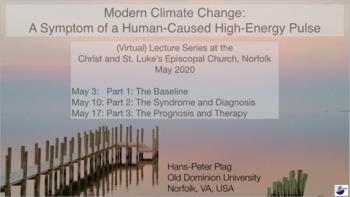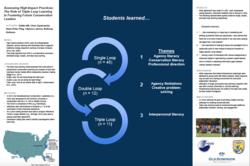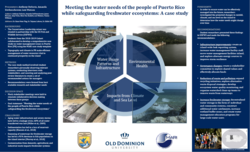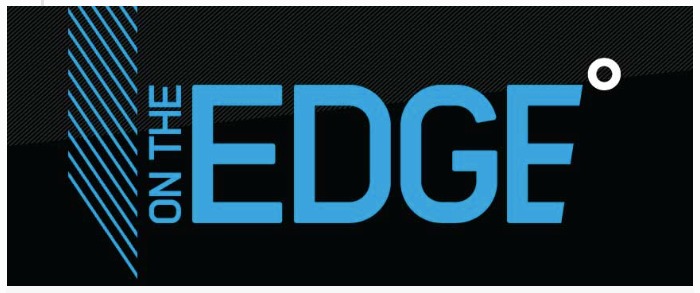Plag, H.-P., Clemson, B., Walker, J., 2023. Place4Us: A Novel Social Collaboration Platform in Service of A United Humanity. Virtual Community J., 1, VCJ2023-1.
Hill, E., Zajchowski, C., Plag, H.-P., Lobova, T., 2022. The Role of Triple Loop Learning in Fostering Future Conservation Leaders: Assessing High-Impact Practices, Journal of Outdoor Recreation, Education & Leadership, 15(1), DOI: 10.18666/JOREL-2023-11394.
Plag, H.-P., Jones, K., Martin, D., Garello, R., 2021. The Urban Coast Under Climate Change and Sea Level Rise: A Potential Hazard to the Ocean and an Ethical Challenge to Humanity. OCEANS 2021: San Diego – Porto, 2021, pp. 1-10, doi: 10.23919/OCEANS44145.2021.9706118.
Plag, H.-P., Jones, K., Garello, R., 2021. A Virtual Center for the Community Addressing the Challenge of Marine Debris. OCEANS 2021: San Diego – Porto, 2021, pp. 1-8, doi: 10.23919/OCEANS44145.2021.9705762
Plag, H.-P., 2020. Modern Climate Change: A Symptom of a Single-Species, high energy pulse. Chapter in Miller, D. E., Egglestone, B.: Moral Theory and Climate Change: Ethical Perspectives on a Warming Planet. Taylor and Francis/Routledge, 2020, pages 6-34.

Part 1, Part 2, Part 3.
Hill, E., Zajchowski, C., Plag, H.-P., Lobova, T., DeSocio, A., 2020. Assessing High-Impact Practices: The Role of Triple Loop Learning in Fostering Future Conservation Leaders. Poster presented at the Undergraduate Research Symposum, Feb. 8, 2020, Old Dominion University, Norfolk, Va.

DeSocio, A., DeVleeschover, A., McCann, J., Perez, A., Van Buskirk, E., Watson, L., Williams, T., 2020. Meeting the Water Needs of the People in Puerto Rico while safeguarding freshwater ecosystems: A case study. Poster presented at the Undergraduate Research Symposum, Feb. 8, 2020, Old Dominion University, Norfolk, Va.

Hill, E., Zajchowski, C., Plag, H.-P., Lobova, T., 2020: Assessing High-Impact Practices: The Role of Tripple-Loop Learning in Fostering Future Conservation Leaders. Abstract published in Journal of Outdoor Recreation, Education & Leadership, Vol. 12, No. 2, pp. 258–260, https://doi.org/10.18666/JOREL-2020-V12-I2-9834.
[2020/01/11] Plag: Modern Climate Change: A Result and Determinant of Global Order. Invited presentation at the meeting of the World Affairs Council for Greater Hampton Roads, January 11, 2020, Virginia Beach (pptx).
Smail, E. A., DiGiacomo, P., Seeyave, S., Djavidnia, S., Celliers, L., Le Traon, P.-Y., Gault, J., Escobar-Briones, E., Plag, H.-P., Pequignet, A.-C., Bajona, L., Zhang, L., Pearlman, J., Steven, A., Hodge, J., Racault, M.-F., Storlazzi, C., Skirving, W., Hoeke, R., Marra, J., Muller-Karger, F., Cripe, D., Takaki, D., 2019. An introduction to the Oceans and Society: Blue Planet Initiative. Journal of Operational Oceanography, DOI: 10.1080/1755876X.2019.1634959, html.
|
Smail, E., Campbell, J., Takaki, D., Plag, H.-P., Garello, R., Djavidnia, S., Moutinho, J., El Serafy, G., Giorgetti, A., Vinci, M., Jack, M. E. M., Larkin, K., Wright, D. J., Galgani, F., Topouzelis, K., Bernard, S., Bowser, A., Colangeli, G., Pendleton, L., Segui, L. M., Canals, L. M., Simpson, M., Marino, A., Zabaleta, I., Heron, M., 2020. A Global Platform for Monitoring Marine Litter and Informing Action, UNEP-GEO Blue Planet White Paper.
Plag, H.-P., Jules-Plag, S-A., 2019. A Transformative Concept: From Data Being Passive Objects to Data Being Active Subjects. Data, 4(4), DOI: 10.3390/data4040135, html.
Plag, H.-P., Jules-Plag, S-A., 2019. A Goal-Based Approach to the Identification of Essential Transformation Variables in Support of the Implementation of the 2030 Agenda for Sustainable Development. International Journal of Digital Earth, DOI: 10.1080/17538947.2018.1561761 (html).
[2019/07/17] Plag: Understanding and Adapting to Modern Climate Change and Sea Level Rise. Invited keynote, Mid Atlantic Biosolids Association 2019 Summer Symposium, July 17-18, 2019, Iselin, New Jersey (pptx)
[2019/01/17] Plag: Lecture at the Institute for Learning in Retirement, Virginia Beach on “The United Nations 2030 Agenda for Sustainable Development” (pptx).
[2018/11/2 ] Plag: Presentation at the workshop held in Brest, France, on November 26-27, 2018 on “Plastics: A rapidly growing global challenge for Earth's life-support system and humanity” (pdf).
[2018/11/08] Plag: Presentation at the workshop on “Grand Challenges in Geodesy”, East Lansing, November 8-9, 2018 on “Will the Global population Have Enough Water to Sustain Itself?” (pdf).
[2018/10/18] Plag: Lecture at the Institute for Learning in Retirement, Virginia Beach on “Modern Climate Change: A Symptom of Humanity's Evolution into a Growth-Addicted Industrialized Civilization” (pptx).
[2018/01/18] Plag: Presentation at the workshop on “Implementing and Monitoring the Sustainable Development Goals in the Caribbean: The Role of the Ocean” on “Gaps in Ocean-Related Knowledge, Products, and Observations” (pdf).
NOT TO BE MISSED

The most recent column published in Autumn 2020 contemplates on how global risk perception may be changed by learning from the “stress test” of the pandemic. Read the column ...
The column published in Summer 2019 contemplates on foresight concerning global castastrophic risk and in particular Anthropocene risks, and raises the question whether the archetypal future of collapse can be avoided. Read the column ...
In his Summer 2018 column, the MARI Director asks “Can we change our priorities to reduce the mounting threats to the ocean?” Read the column ...
The Spring 2018 column identifies “Modern Climate Change — A Symptom of a Single-Species High-Energy Pulse.” Read the column ...
See all the contributions to the “On the Edge” ...
|

